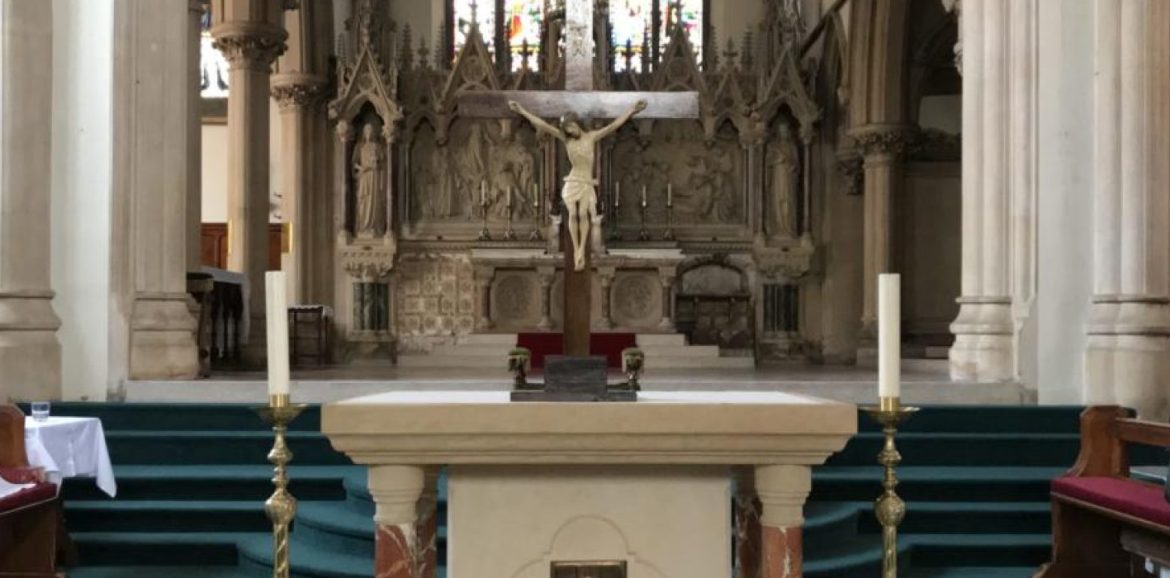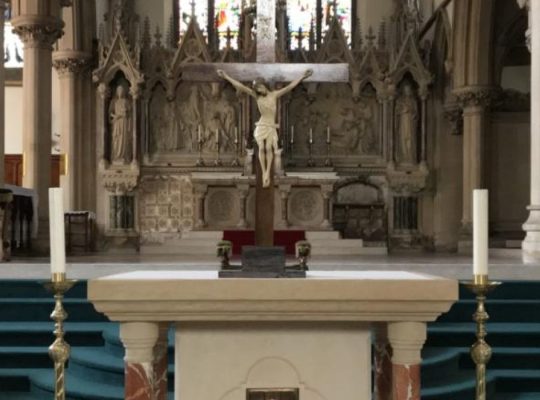Just before his account of Pentecost, Luke tells of the selection, suggested by Peter, of a replacement for Judas, to be ‘counted with the eleven apostles.’ Nothing about the origins of the Christian community can be a matter of indifference for us. There are always teachings that point to later developments in the Church. The apostles chosen by the Lord had authority over the Church at this time. Yet God himself was clearly present, his Spirit guiding the first steps of the Church established by his Son.
No specific date for the gathering is given, only the phrase ‘during those days.’ Not many years ago, this was said at the beginning of the proclamation of the Gospel at Mass: ‘In those days.’ One thing is certain: a group had formed even before Pentecost. Already it was large: ‘about one hundred and twenty persons.’ Most importantly, Peter appears here as the leader of the community, the first of the apostles. He is the one who suggests to the community that a replacement for Judas should be found, and established criteria for the candidates. But why ‘is it necessary’ to appoint someone to Judas’ place? The argument that Peter draws from Scripture—’For it is written in the Book of Psalms: ‘may another take his office’’ hardly seems convincing to us. Rather, we feel that a seemingly haphazard selection of scriptural texts is a forced way of saying something. But this is not the only time that the New Testament refers to Psalm 69, particularly with respect to the events of the passion. If this Psalm is read as a prophecy of what would happen to Jesus, it is perfectly natural to apply to Judas a verse that seems to fit him so well. He did not prophet by his treachery: he cast away the money he had received, and it was used to buy a piece of barren land. As for Psalm 69, it is the prayer of a persecuted just man. How can we read Psalm 69 without thinking of Christ and his passion when a friend betrayed him? Doesn’t the verse, ‘May another take his office (Psalm 109 :8b) suggest a replacement for Judas? This is what Peter thinks. Jesus chose a group of Twelve; the fact that one proved to be a traitor must not disrupt this group: appointing a replacement is authorised by Scripture. Thus, the group will not feel that one of its members has been cut off.
Peter suggests choosing a man from among those who accompanied Jesus the whole time he lived on earth, ‘from the baptism of John until the day which he is taken up from us,’ i.e., during the time of his public ministry. This man will be, along with the Eleven, ‘a witness to [Jesus’] resurrection,’ which cannot be separated from what Jesus did and taught ever since his first appearance on the banks of the Jordan. The testimony of the Twelve is and remains a foundation of the Church’s faith. Nothing can replace it. Hence, not every member of the Twelve will be replaced when he dies, e.g., James, the brother of John, the first to perish by the sword (Acts 12:22). Those who will later be called ‘successors of the apostles’—the bishops—together assure the continuity of the Twelve’s authority in the Church’s mission and pastoral government. Thus, their number has no limit. However, the Twelve are still privileged and official witnesses to the resurrection.
Two men are presented who fit Peter’s criteria: ‘Joseph called Barsabbas, who was also known as Justus, and Mathias.’ The assembly prays that God, who knows the human heart, may show which one he chooses. They cast lots, and Mathias is chosen.
Jesus told the apostles: ‘It was not you who chose me, but I who chose you.’ The appointment of Mathias shows that one does not arrogate the ministry to oneself: one is called to it by God and the Church. To offer oneself as a candidate under the impulse of grace is a good and proper thing: ‘Whoever aspires to the office of bishop desires a noble task.’ However, this desire must be tested: one must submit oneself to the Church’s discernment, through which God’s will is made manifest. Joseph Barsabbas must have been a man with remarkable qualities, since he was called ‘the just’ (Justus). Yet Mathias became the twelfth apostle; after that, he is mentioned no more in Acts.
Before leaving us, Jesus laid the foundations of his Church: the apostles who accompanied him throughout his ministry and who became witnesses to his resurrection. Through them, the Gospel has been preached to all nations and faithfully passed on to us. Their ministry is perpetuated in the college of bishops, with the Pope as its head. ‘This college in so far as it is composed of many members, is the expression of the multifariousness and universality of the people of God; and the unity of the flock of Christ, in so far as it assembled under one head.’ The Lord’s promise never ceases to be realised: he watches over his own as he promised, for when ‘the hour had come for him to pass from this world to the Father,’ Jesus, in a profoundly moving prayer, entrusted his disciples to the one whom he was about to rejoin. This confident intercession reveals that the Lord, who is now seated at the right hand of the Father in heaven, watches over his own today even better than he could while he was visibly present in their midst. For this prayer, said before the passion, belongs to the resurrected Lord raised in God’s presence as his Son.
The Gospels tell us this: the whole time he was with them, Jesus watched over his disciples. They clearly recognised this: even when the Lord sent them out ‘without a money bag or a sack or sandals,’ they lacked nothing. With infinite patience, he kept them faithful to the Father’s name, he taught them the Word, striving, in ever new ways and without being discouraged, to open their minds to it. Despite what he demanded of them, not one of them was lost, except Judas, through his own fault. Jesus, nevertheless, did not lack vigilance on his behalf and did not test his weakness. This reminder of the defection of one of the Twelve—’Even my friend who had my trust and partook of my bread, has raised his heel against me’ (Psalm 41:10)—is a solemn and tragic appeal to our fidelity and, paradoxically, an assurance. Nothing can corrupt the one who remains attached to the Father and his Son, whoever trusts in them.
Jesus first asks his Father that his disciples may remain faithful to the Word. It will give them cause for joy in the midst of their trials. Even if the ‘world’ persecutes them, they will see in this hate an acknowledgement of their Christian authenticity. After being beaten for their preaching, the apostles ‘left the presence of the Sanhedrin, rejoicing that they had been found worthy to suffer dishonour for the sake of the name.’ (Acts 5:41)
Jesus does not ask the Father to take the disciples from the world, but to guard them from the evil one; indeed, they are ‘sent into the world.’ To try to evade this would be a temptation, a lack of faith and confidence in God as well as a desertion. When Christians pray, they say: ‘Our Father, who art in heaven, halloween be thy name. Thy kingdom come…….. deliver us from evil.’ In the letter to the Romans we hear: ‘What will separate us from the love of Christ? Distress, anguish, persecution, hunger, want, peril, the sword? What will separate us from the love of Christ? Yes I am confident that neither death, nor life, nor angels, nor the present, nor the future, nor powers will do so. What will separate us from the love. Of Christ? Neither the powers of height nor depth, nor any other creature, nothing can separate us from the love of God, manifested in Jesus Christ, our Saviour.’
Finally, Jesus asks his Father that the disciples may be consecrated in truth, and that they may be ‘one.’ In a hostile world, the Christian life that is faithful to God and to his Christ, the witness given by prayer and the proclamation of the good news are worship of God. They are offerings acceptable to him, as was Christ’s. Without this, worship rather offends Gods than pleases him.
Throughout his life, Jesus prayed: when he participated in the synagogal liturgies or Temple celebrations, when he spent whole nights in solitude. But the veil was lifted on the eve of his passion: when the ‘hour had come for him to pass from this world to the Father,’ he prayed aloud in his disciples presence. The prayer he addressed to his Father reveals him as the Lord, such as he is before God and for us.
Sent by the Father for our salvation, he eternally intercedes for his own so that they may pursue the mission conferred on them, in fidelity to the Word in truth, unity, and joy. As he loved his own in the world to the end, Jesus, seated at the right hand of the Father, loves them for eternity. Through his prayers as beloved Son, he continues to watch over his disciples, that none of them may be lost. He, the only one who has ever seen God, sees him also in those to whom he has made the Father known.
All the more reason that we, who have never seen God’s face, should recognise him in those around us. Each of us is a reflection of the invisible face of God for others. In loving one another, it is God whom we love! The love of God revealed in Jesus Christ and poured out in our hearts by the Holy Spirit is the source and object of the preaching of the Church founded on the apostles, witnesses of all that Jesus did and of his resurrection. This is also the love that gathers us together to remember Christ’s passover in the celebration of the Eucharist, sharing the same bread, drinking the same cup while saying to each other: ‘God so loved the world!…..’ And we pray: Father……grant that we, who are nourished by his body and blood, may be filled with his Holy Spirit, and become one body, one spirit in Christ. May he make us an everlasting gift to you.’


